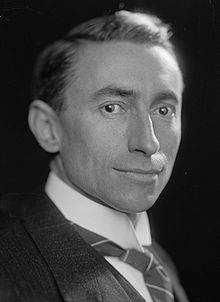Hugh S. Gibson
| Hugh Simons Gibson | |
|---|---|
 |
|
| Born |
August 16, 1883 Los Angeles, California |
| Died | December 12, 1954 (aged 71) Geneva, Switzerland |
Hugh Simons Gibson (August 16, 1883 – December 12, 1954) was an American diplomat.
Gibson was actively involved in disarmament talks from 1925 to 1932. Throughout his career, together with such colleagues, ambassadors Joseph C. Grew, William R. Castle, and Hugh R. Wilson), he remained a leading proponent in the drive to establish a professional Foreign Service based on merit rather than personal wealth or political influence.
He was active in famine relief work in Europe during and after World War I and continued to pursue these efforts during and after World War II. His close friendship with Herbert Hoover began in this context.
As first American minister plenipotentiary to Poland in the chaotic postwar years from 1919 to 1924, he was called upon to respond to the acute problems of a renascent state while investigating reports of pogroms and mistreatment of Polish Jews. His reporting on this highly sensitive matter was surrounded by controversy, but ultimately won the approval of significant figures in the American Jewish community.
Gibson retired from the Foreign Service in 1938, worked in London for the Commission for Relief in Belgium (CRB) during the first two years of the war. He then returned to the United States and worked in publishing at Doubleday, Doran and Co. and, following the end of the war, published the journals of Joseph Goebbels, Galeazzo Ciano, and Ulrich von Hassell.
In his final years he ran the Intergovernmental Committee for European Migration in Geneva.
Hugh Simons Gibson was born in Los Angeles, California, on August 16, 1883, the son of Francis (Frank) Asbury Gibson and Mary Kellogg Simons. He died in Genthod, Geneva, Switzerland, December 12, 1954)
He graduated from the prestigious École libre des sciences politiquesin Paris in 1907 and entered the United States foreign service in his late twenties. He was appointed Secretary of Legation in Tegucigalpa, Honduras in July 1908; second secretary of the American Embassy in London in 1909–1910; private secretary to Assistant Secretary of State Huntington Wilson in 1910-1911; secretary of Legation, Havana, Cuba in 1911–1913 and secretary of the Legation, Brussels, Belgium 1914–1916, as a result of which he wasp present when the German Army invaded the country.
...
Wikipedia
